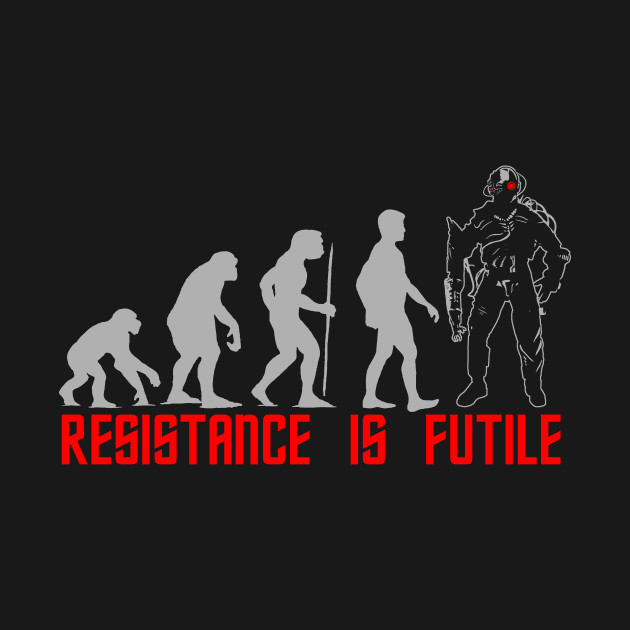
“Conservatives uphold voluntary community, quite as they oppose involuntary collectivism.” Russell Kirk – Ten Conservative Principles
Awhile back I wrote a brief series on the conservative principle of variety, noting how Star Trekforetold a future in which barriers of culture, religion, class, nationalities, and politics had given way to global uniformity. This conformity was often celebrated in the series as a noteworthy achievement in the advancement of the human species.
Interestingly, the series depicted another kind of uniformity that was portrayed as diabolical. As one of the most memorable villains of the Star Trek franchise, the Borg represented an existential threat to the utopia humanity had achieved. The Borg were cybernetic organisms, linked in a hive mind called "the Collective". They forcibly and relentlessly transformed other life forms they encountered into the Collective through a gruesome process called “assimilation" which striped the individual of their individuality in body, mind, and spirit. Their infamous greeting warned of their malicious intent:
"We are the Borg. Lower your shields and surrender your ships. We will add your biological and technological distinctiveness to our own. Your culture will adapt to service us. Resistance is futile."
Humanity had achieved a post-scarcity economy. As such, the inequalities that had plagued human history had melted away and humans were “free” to unify under a single, benevolent state called the Federation. Now that humanity had rid itself of all bigotry and inefficient variety, all was well with the world. But not quite. For this new utopia was threaten by many outsiders who didn’t share in this unifying vision, not the least of which were the tyrannical Borg who would stop at nothing to achieve their goal of perfection.
Juxtaposed Uniformities
Star Wars presents us with two radically different visions of what it means to live in uniformity. Two competing ideas are at work here that are universally apprehended: 1) humans yearn to be free individuals, and 2) humans yearn to be in community. The Borg were depicted as evil because they forsook the former to achieve the latter. The Federation were depicted as virtuous because they held to a semblance of both.
Deep within our core we know there’s something wrong with a world of absolute uniformity. And yet, there still exists fierce disagreement over what balance between individuality and community is ideal. The Star Trek universe could answer the question in the same way it explained the technological advances of the future: it bent reality. How was the Enterprise able to travel faster than light? Dilithium crystals. How was humanity able to achieve a utopia that ended poverty and bigotry? Delusionary thinking.
Star Trek may have something to say about the inner yearnings of humanity, but it has nothing to say about the practical realities we face. Science may some day advance to the point we can beam humans across great distances in a matter of seconds. But human nature will never evolve to the point we enter terrestrial utopia. Science is inherently progressive. Human nature is inherently constant.
The point is, when dealing with the ideal aims of striking a healthy balance between individuality and community we must first rid ourselves of hopelessly wishful visions of a utopian future. Communities will never be perfect. Nor should we demand perfection before recognizing the powerful bond of community. And that bond can provide an individual a sense of purpose and a greater understanding of who they are.
Amish Debaucheries
This powerful bond is easily seen in close-knit communities. Take the Amish, for example. The Amish are a Christian sect known for their plain living and unwillingness to use modern technology. Such that many Amish forego such conveniences as electricity, telephones, vehicles, and even insurance. As a result, the Amish, depending on one another for their basic needs, form communities with that are very strong yet very lacking in the basic amenities many Americans would be devastated to go without.
Personally, I find the most fascinating thing about the Amish to be the degree to which they’re willing to allow their children to experience the worldly pleasures they so carefully avoid. When Amish children turn 16, they’re permitted—nay, encouraged—to enter the broader world around them and partake in whatever carnal pleasures they desire in an unusual practice called Rumspringa.
Teenagers, laden with hormones and insufficiently developed brains, are set free from their insulated life and, for the first time, turned loose to enjoy whatever they may. It’s difficult to wrap one’s head around the cultural shock that would follow someone who’s led such a sheltered, simple lifestyle experience the temptations of this world in full force all at once. The 2002 film Devil’s Playgroundgives us a sense of what this looks like.
The idea behind Rumspringa is that Amish children are far more likely to remain Amish if they’re given a choice. Those who have experienced all the pleasures the world has to offer may freely choose to turn back to the life they had always known. And that choice will be permanent. What’s even more remarkable is that 80 percent of Amish youth do choose to return to the Amish lifestyle!
Roots
While their reasons for doing so may be many and complex, it would seem evident the strong bond of the community Amish children had known their whole lives plays a vital role in their decision. Community trumps conveniences. Russell Kirk observed a certain desperation for this level of community in the modern age: “Man’s longing for community is among his deepest impulses, and this yearning often is frustrated in the twentieth century. If the need of the eighteenth century was for emancipation, the need of the twentieth century is for roots.”
Americans see the benefit of community, and conservatives do not believe that the best possible society is the society in which everyone is looking out for themselves, with no interest, compassion, or duty to anyone else. A sense of community—that we’re in this together—is essential.
The question is, what kind of community? Is it voluntary or involuntary? The Amish have so little to offer in their primitive communities. Yet they rarely lose converts. The Borg boast of technological advances beyond our understanding. Yet we instinctively fear this kind of belonging. What are the markings of a genuine, healthy community, and what are the warning signs of a mere collectivism that destroys our individuality and crushes our spirit? Those are the questions we’ll seek to answer in Part 2 of this series.
from savingelephantsblog
via https://www.savingelephantsblog.com/saving-elephants-blog


